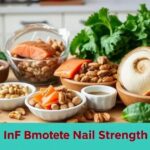Bone loss and osteoporosis risk after menopause result from lower estrogen levels that accelerate bone density loss, increasing fracture risk; maintaining bone health requires nutrient-rich diets, regular weight-bearing exercise, and lifestyle changes including supplements and fall prevention.
Bone loss and osteoporosis risk after menopause often catch women by surprise. Have you noticed changes in your body that don’t quite add up? Understanding these shifts can help you take gentle steps toward stronger, healthier bones every day.
The Calm Reset — 7 Days to Feel Steady, Kind & In Control Again - Only $2.99
Gentle guidance trusted by our community.
Table of Contents
how menopause affects bone density
Menopause triggers significant changes in hormone levels, particularly the drop in estrogen, which plays a crucial role in maintaining bone density. Estrogen helps protect bones by slowing the breakdown process, so when levels fall, bones begin to lose density more quickly. This bone loss after menopause increases the risk of osteoporosis, a condition where bones become fragile and more likely to break.
During the years around menopause, women can lose up to 20% of their bone density if no protective measures are taken. This loss often happens silently, without symptoms until a fracture occurs. Understanding how menopause affects bone density helps women take early action.
Hormonal Impact on Bone Remodeling
Bone is a living tissue that constantly renews through a process called remodeling. Cells called osteoclasts break down old bone, while osteoblasts build new bone. Estrogen balances these two processes. Without enough estrogen, osteoclast activity accelerates, leading to more bone loss than formation.
Timeframe and Risk Period
The most rapid bone loss tends to occur in the first 5 to 7 years after menopause. This period is critical for implementing strategies to slow down bone loss and protect skeletal health over the long term.
Other Contributing Factors
Besides hormonal changes, aging skin, reduced calcium absorption, and lifestyle factors such as physical inactivity or smoking can worsen bone density loss. Knowing these risks can guide healthier choices.
common signs of bone loss after menopause
Bone loss after menopause often develops quietly, without noticeable symptoms until bones become weak or fractures occur. However, certain signs may hint at declining bone density. Recognizing these symptoms early can prompt timely medical consultation and preventive actions.
Frequent Bone Fractures
If you experience fractures from minor falls or bumps, it may indicate weakened bones. Common fracture sites include the wrist, hip, and spine.
Loss of Height
A noticeable decrease in height over time can result from compression fractures in the spine caused by bone loss. This shrinkage often happens gradually.
Back Pain or Posture Changes
Sudden or chronic back pain may arise from vertebral fractures. Bone loss can also cause a stooped or hunched posture, sometimes referred to as a “dowager’s hump.”
Fragile Nails and Dental Issues
Weaker bones can be accompanied by brittle nails and dental problems like tooth loss, since the jawbone may also lose density.
Decreased Physical Strength
Reduced muscle strength and increased fatigue may make daily activities harder, indirectly signaling bone mass reduction.
Paying attention to these signs, especially in postmenopausal women, is important to seek professional evaluation and explore treatments or lifestyle changes that support bone health.
nutritional habits that support bone health
Maintaining strong bones after menopause requires attention to diet and nutrient intake. Certain nutritional habits play a vital role in supporting bone health and reducing the risk of osteoporosis.
Calcium-Rich Foods
Calcium is essential for bone strength. Include dairy products like milk, yogurt, and cheese, as well as leafy green vegetables such as kale and broccoli. Fortified plant-based milks and juices can also provide calcium for those who avoid dairy.
Vitamin D for Absorption
Vitamin D helps the body absorb calcium efficiently. Foods like fatty fish (salmon, mackerel), egg yolks, and fortified cereals are good sources. Additionally, moderate sunlight exposure helps the skin produce vitamin D naturally.
Protein Intake
Adequate protein supports bone repair and muscle strength, which helps protect bones from falls. Include lean meats, beans, lentils, tofu, and nuts in your meals.
Magnesium and Potassium
These minerals also contribute to bone density. Nuts, seeds, whole grains, and fruits like bananas and oranges are excellent sources.
Avoiding Excessive Salt and Caffeine
High amounts of salt and caffeine can increase calcium loss through urine. Limiting processed foods and reducing coffee consumption supports better bone retention.
Combining these dietary habits with a balanced lifestyle can provide your bones with the nutrients they need to stay healthy and strong after menopause.
exercise routines to strengthen bones
Exercise is a key factor in maintaining and improving bone strength, especially after menopause. Certain routines stimulate bone growth and help prevent bone loss by applying gentle stress to the bones.
Weight-Bearing Exercises
Activities like walking, jogging, dancing, and climbing stairs force your body to work against gravity, which stimulates bone formation. Aim for at least 30 minutes most days of the week.
Resistance Training
Using free weights, resistance bands, or weight machines helps build muscle strength and places stress on bones, which encourages bone density improvement. Focus on major muscle groups 2-3 times per week.
Balance and Flexibility Exercises
Practices like yoga, tai chi, and balance drills improve coordination and stability, reducing the risk of falls that can cause fractures.
Low-Impact Activities
For those with joint concerns, swimming or cycling can improve overall fitness without putting excessive strain on bones, though they may not directly increase bone density.
Consistency and Progression
Regular exercise with gradual increases in intensity or duration is important for sustained bone benefits. Consult with a healthcare provider before starting new programs.
Combining these exercise types can create a balanced routine that supports strong bones and better mobility over time.
natural supplements for osteoporosis prevention

Natural supplements can play an important role in supporting bone health and reducing the risk of osteoporosis, especially after menopause. These supplements help fill nutritional gaps that may not be met through diet alone.
Calcium Supplements
Calcium is vital for bone strength. When dietary intake is insufficient, supplements can help meet daily needs. It’s important to choose the right form, such as calcium citrate or calcium carbonate, and take it with meals for better absorption.
Vitamin D
Vitamin D helps the body absorb calcium effectively. Natural supplements of vitamin D3 are commonly recommended to maintain adequate levels, especially for those with limited sun exposure.
Magnesium and Zinc
Both minerals support bone structure and density. Magnesium helps with calcium metabolism, while zinc is involved in bone tissue growth and repair. Taking them in balanced amounts can be beneficial.
Collagen Peptides
Collagen is a key protein in bones and joints. Supplementing with collagen peptides may improve bone strength and aid in maintaining the matrix that supports bone resilience.
Phytoestrogens
Plant-based compounds like isoflavones found in soy may mimic estrogen’s protective effects on bones. While research is ongoing, some women find these supplements helpful.
Before starting any supplement, it is advisable to consult with a healthcare professional to ensure safety and proper dosage. Combining supplements with a balanced diet and lifestyle optimizes bone health and helps prevent osteoporosis.
lifestyle changes to reduce fracture risk
Making smart lifestyle changes after menopause can significantly lower the risk of fractures by strengthening bones and improving overall health. These adjustments support bone resilience and help prevent falls.
Maintain a Balanced Diet
Eating a diet rich in calcium, vitamin D, and other bone-friendly nutrients is essential. Choose fresh fruits, vegetables, dairy or alternatives, and lean proteins to provide the building blocks for strong bones.
Stay Physically Active
Regular exercise, especially weight-bearing and resistance training, improves bone density and muscle strength. Strong muscles enhance balance, reducing the chance of falls that cause fractures.
Avoid Smoking and Limit Alcohol
Smoking damages bone cells and reduces estrogen levels, increasing bone loss. Excessive alcohol intake interferes with calcium absorption and bone formation. Cutting back on these habits supports bone health.
Ensure Home Safety
Reduce fall risks by clearing clutter, securing rugs, installing grab bars, and ensuring good lighting in living spaces. Safety-proofing your home is a simple yet effective way to protect fragile bones.
Regular Health Checks
Keep up with bone density tests and talk to your doctor about medications or supplements as needed. Monitoring bone health helps catch problems early.
Adopting these lifestyle changes fosters stronger bones and a lower fracture risk, helping you live confidently and healthily after menopause.
Taking steps to protect your bones after menopause
Bone loss and osteoporosis risk increase after menopause, but you can take control through informed choices. Simple lifestyle changes, good nutrition, regular exercise, and careful use of supplements all support stronger bones.
Being aware of early signs and working with your healthcare provider helps you protect your bone health and reduce fracture risk. Making these efforts today can lead to healthier, more active years ahead.
Remember, small steps add up to big benefits for your bones and overall well-being after menopause.
FAQ – bone loss and osteoporosis risk after menopause
What causes bone loss after menopause?
Bone loss after menopause is mainly caused by a drop in estrogen levels, which slows down the body’s ability to maintain bone density.
What are the common signs of osteoporosis after menopause?
Common signs include frequent fractures, loss of height, back pain, changes in posture, brittle nails, and dental issues.
Which nutrients are important for bone health post-menopause?
Calcium, vitamin D, magnesium, potassium, and protein are essential nutrients that help maintain strong bones.
What types of exercises strengthen bones effectively?
Weight-bearing exercises, resistance training, and balance and flexibility activities like yoga or tai chi are beneficial for bone strength.
Can natural supplements help prevent osteoporosis?
Yes, supplements such as calcium, vitamin D, magnesium, zinc, collagen peptides, and phytoestrogens can support bone health when combined with a balanced diet.
What lifestyle changes can reduce fracture risk?
Maintaining a balanced diet, staying physically active, avoiding smoking and excessive alcohol, ensuring home safety, and regular health check-ups all help reduce fracture risk.
The Calm Reset — 7 Days to Feel Steady, Kind & In Control Again - Only $2.99
Gentle guidance trusted by our community.






